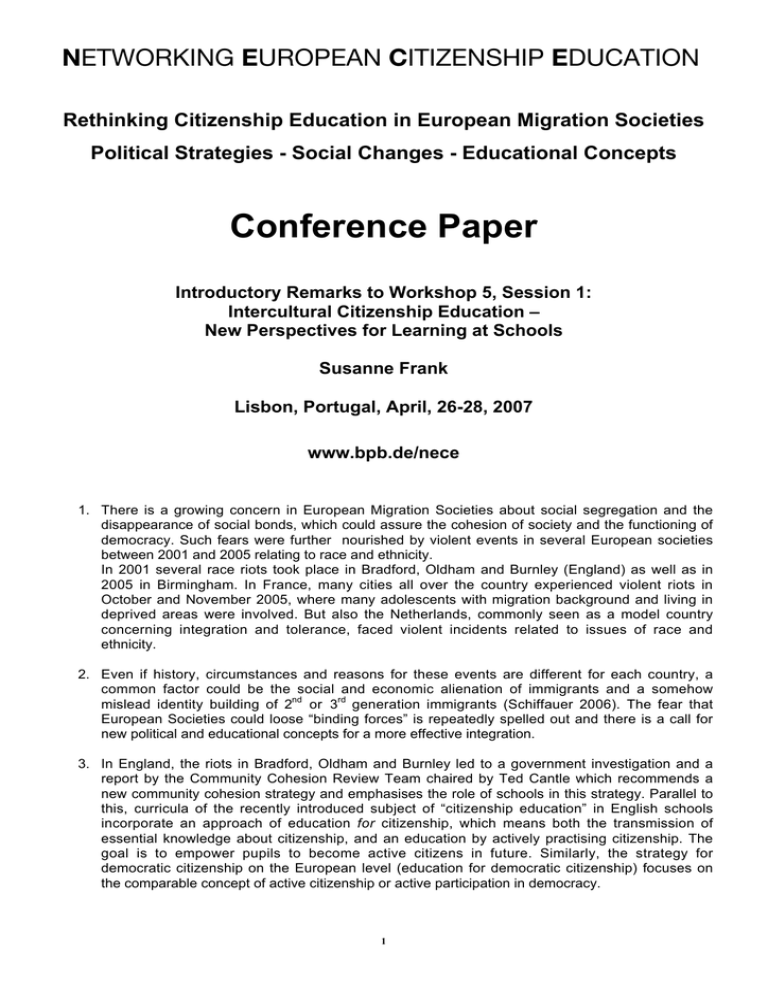N
advertisement

NETWORKING EUROPEAN CITIZENSHIP EDUCATION Rethinking Citizenship Education in European Migration Societies Political Strategies - Social Changes - Educational Concepts Conference Paper Introductory Remarks to Workshop 5, Session 1: Intercultural Citizenship Education – New Perspectives for Learning at Schools Susanne Frank Lisbon, Portugal, April, 26-28, 2007 www.bpb.de/nece 1. There is a growing concern in European Migration Societies about social segregation and the disappearance of social bonds, which could assure the cohesion of society and the functioning of democracy. Such fears were further nourished by violent events in several European societies between 2001 and 2005 relating to race and ethnicity. In 2001 several race riots took place in Bradford, Oldham and Burnley (England) as well as in 2005 in Birmingham. In France, many cities all over the country experienced violent riots in October and November 2005, where many adolescents with migration background and living in deprived areas were involved. But also the Netherlands, commonly seen as a model country concerning integration and tolerance, faced violent incidents related to issues of race and ethnicity. 2. Even if history, circumstances and reasons for these events are different for each country, a common factor could be the social and economic alienation of immigrants and a somehow mislead identity building of 2nd or 3rd generation immigrants (Schiffauer 2006). The fear that European Societies could loose “binding forces” is repeatedly spelled out and there is a call for new political and educational concepts for a more effective integration. 3. In England, the riots in Bradford, Oldham and Burnley led to a government investigation and a report by the Community Cohesion Review Team chaired by Ted Cantle which recommends a new community cohesion strategy and emphasises the role of schools in this strategy. Parallel to this, curricula of the recently introduced subject of “citizenship education” in English schools incorporate an approach of education for citizenship, which means both the transmission of essential knowledge about citizenship, and an education by actively practising citizenship. The goal is to empower pupils to become active citizens in future. Similarly, the strategy for democratic citizenship on the European level (education for democratic citizenship) focuses on the comparable concept of active citizenship or active participation in democracy. 1 NETWORKING EUROPEAN CITIZENSHIP EDUCATION 4. Accordingly, two key terms in the most recent policy and educational approaches are “active participation” and “community cohesion”. The concept of participation focuses on the level of the individual being equipped with resources to take part in democracy. The concept of cohesion focuses on the level of the community or society as a whole. By establishing good relations and communication within communities, different views of the “good life” could be discussed and common goals could be defined as well as similar life opportunities could/should be established. All individuals and groups are considered to be part of the community. In so far participation and cohesion are the “two sides of the same medal”. 5. Several theoretical approaches have underlined that active participation enhances the identification process and feeling of belonging thought to be crucial for a cohesive society. As early as 1916, John Dewey pointed out that a society must have things in common to be a community. The process to have things in common is built by communication. As Dewey insisted, it is not by chance that the terms common, community and communication have the same linguistic root. In fact, communication is a precondition and a constitutional factor to discuss and develop perceptions of the “good life” and to organise the life of the community. 6. In multicultural and multiethnic contexts as they have become the norm in today’s European societies and schools, educational approaches which can develop and strengthen bridging forces (Putnam) between different individuals and groups and provide every pupil with knowledge, skills and attitudes to become an active citizen, are essential. Taking part in a society and being considered member of a society will at the same time depend on a feeling of belonging to this society and nourish the development of identity. 7. The workshop will focus on the question: How could then the curriculum provide pupils with contents and develop skills in pupils to answer the central questions – as Kenan Malik summarised it in his contribution to the conference: a. Who am I? b. Where are we? c. What society do we want to live in? 8. Furthermore, it will be discussed which measures can be taken to provide all pupils, irrespectively of their cultural, racial, ethnic or language background, in citizenship education with the resources (knowledge and skills) for the above mentioned active participation? 9. The contributions of the workshop focus on several levels of policy and research in different countries: a. The policy approaches - Portugal and Europe (Isabel Ferreira Martins): outline of intercultural education policy in Portugal and European strategies for democratic citizenship b. Status quo of learning materials in Germany (Frank-Olaf Radtke): the “we” and “they” in German textbooks used in political and social science classes in schools c. Curriculum review to be accomplished in England (Liz Craft and Scott Harrison): Citizenship and Diversity in the Curriculum in England. 2




